
DISCLOSURE: This post may contain affiliate links, meaning when you click the links and make a purchase, I receive a commission. As an Amazon Associate I earn from qualifying purchases.
Sprouting is a fun hobby to pursue at home, and sprouts are an easy, cheap way to add extra nutrition to your diet. We can use many different seeds for sprouts, such as alfalfa, sunflower, cabbage, chives, lentils, and mung beans.
However, many sprout enthusiasts give up when they encounter the problem of smelly sprouts. This problem is prevalent with mung beans. In this post, we’re going to look at growing mung bean sprouts, why they sometimes smell bad, whether they’re still safe to eat and how you can fix the problem.
Help! My mung beans sprouts smell!
This is a surprisingly common problem among people who sprout their mung beans. When these sprouts smell bad, they smell like rotting eggs, sulfur, or even as if something has died in your kitchen.
The reason they smell bad is that bacteria and other microorganisms have started growing alongside your sprouts. There are several reasons for this. First, we’ll look at what they are and how you can prevent them.
Causes of Smells on Mung Beans Sprouts
1. Bad quality seeds
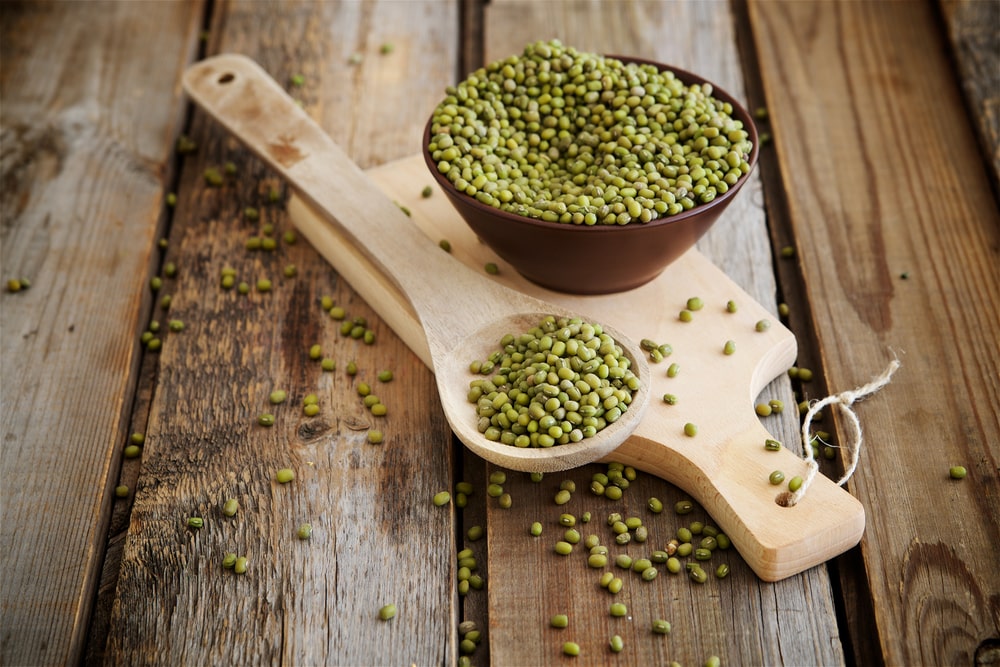
While it is not strictly necessary to buy special “sprouting seeds,” it is recommended. You should make sure you buy your seeds from a place with an excellent turnover to ensure they are fresh.
Also, be sure to check the date stamp on the packet, ensure the package and its contents look clean, and remember not to buy seeds that have been sprayed with insecticides. Health food stores are usually the best places to buy good seeds.
[amazon box=”B00U9WRX5E”]
However, even better is to buy proper “sprouting seeds” from a reputable supplier. This ensures that the seeds have been tested for any pathogens that cause problems when sprouting. The FDA said that over 2500 foodborne illness cases were directly linked to sprouts in the last 30 years. The main reason was contaminated seeds.
2. Incorrect seed storage methods
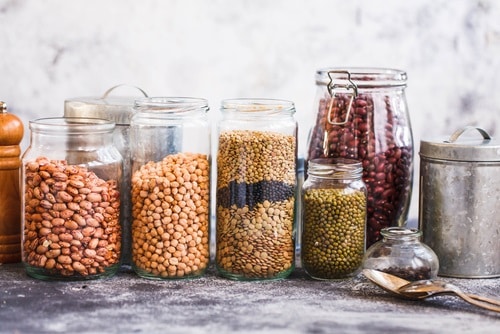
Please don’t sprout an old packet of seeds that you found at the back of your grandma’s kitchen drawer. Like all food, seeds have a “best before” date. Every seed packet should have this date on it. If there is no date, throw them away. As a rough guide, most sprouting seeds are good for around 5 years.
It would be best if you store seeds in a dark, dry, cool place. For instance, in a pantry in airtight glass jars.
3. Failure to rinse
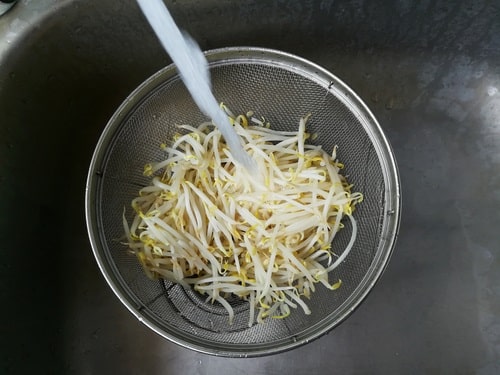
Before soaking and sprouting the seeds, you must rinse them well under clean, cold, running water. This is in case there are any bacteria or mold spores on the outside of the seeds. It will also get rid of any dust.
4. Incorrect soaking methods
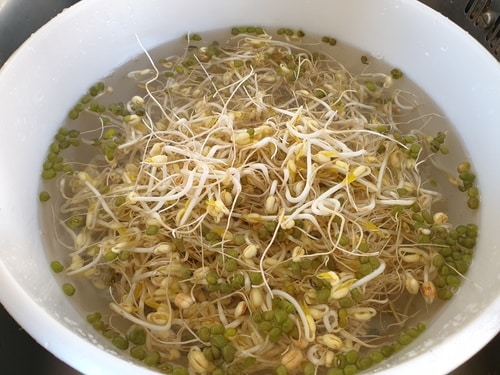
It is essential to pre-soak seeds for sprouting. The amount of water used is not serious as the seeds will absorb as much as they need. This starts the germination process. Do not make the mistake of soaking them for too long, though, or you may kickstart the growth of mold or bacteria. Different seeds have different recommended soaking times and water temperatures so consult a sprouting guide.
5. Incorrect rinsing
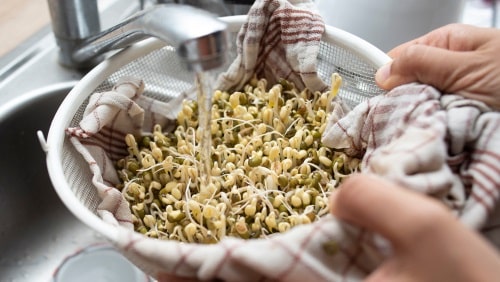
Regular rinsing of the sprouts in freshwater is a vital part of the sprouting process. It needs to be done at least twice a day. Failure to do this is the most common cause of smelly mung bean (and other) seeds. Rinsing in generous amounts of clean, cool water removes mold and bacteria and provides an ideal growing environment for your sprouts. Remember: rinse often!
6. Poor drainage
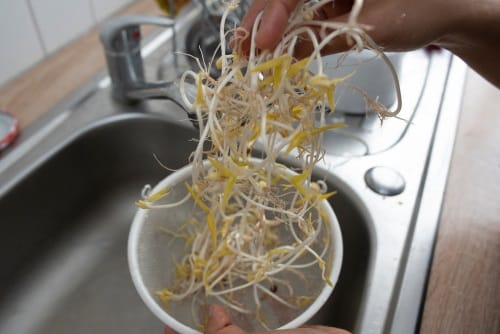
The sprouts must not sit in water. After rinsing, you must adequately drain them. If the sprouts sit in water, they will become contaminated with pathogens and begin to smell bad. They will also rot and have to be thrown away.
Sometimes, the holes in sprouters become blocked with tiny seeds, and the water cannot drain properly. Solve this by cleaning the holes with a toothpick or something similar. Remember: remove any excess water!
7. Bad air circulation
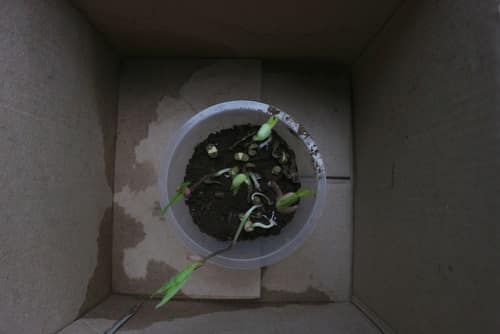
Sprouts need fresh, well-circulating air to thrive. Never keep sprouts in a dark cupboard or pantry. While they should not be in direct sunlight, they need a light, airy place with good airflow. This prevents the growth of pathogens.
8. Poor hygiene
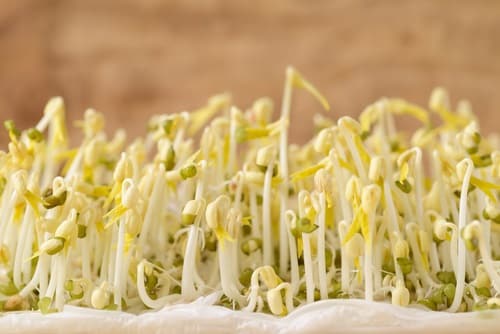
You need to be fairly strict with cleanliness when growing sprouts. Wash all sprouting equipment in hot, soapy water after each growing cycle. The dishwasher is great for this. Washing them in diluted bleach works, too, while some growers use hydrogen peroxide to clean their equipment. Wash your hands well before handling your seeds and sprouts.
9. Fruit flies
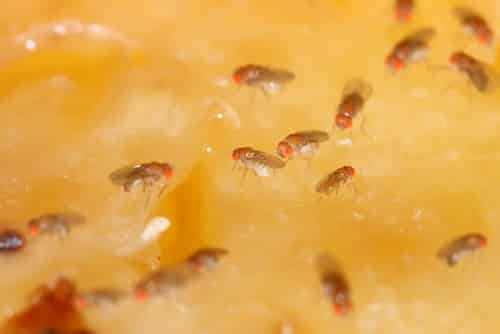
Fruit flies carry germs, so you don’t want them flying around and settling on your sprouts. If they are a problem in your area, you will need to work out ways of keeping them away.
Are smelly mung bean sprouts safe to eat?
The short answer is no. Sprouts should never have a bad smell. If they do, this indicates that they have gone bad and have become contaminated with germs that could make you sick. So please do not take a chance. Instead, throw them away, clean your equipment, and start with a fresh batch.
Once you have a fresh batch, you can enjoy them in many dishes. They’re especially good in stir-fries. The Chinese have cooked with mung bean sprouts for thousands of years, so please don’t be put off by one bad experience.
We hope this has helped you identify the reason for your smelly mung beans and helped you to fix the problem. Please don’t hesitate to contact us if you have any questions. Happy sprouting!